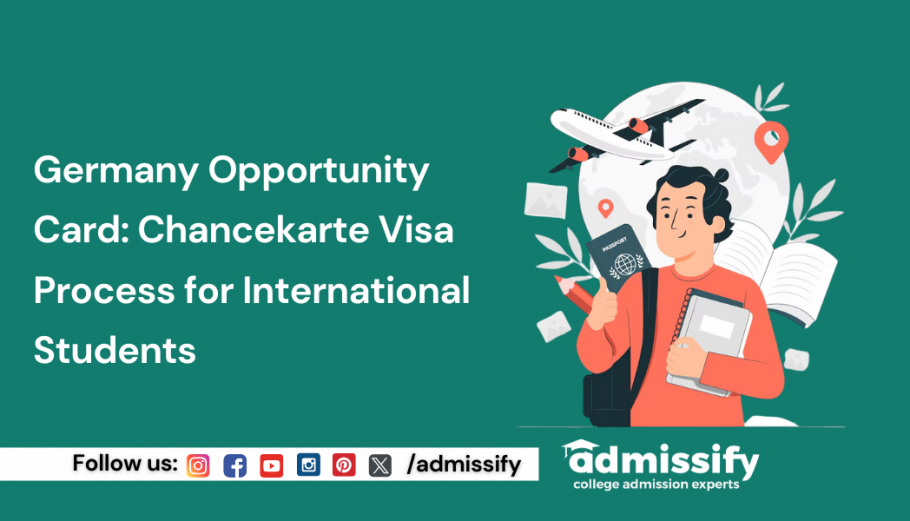Last Updated on December 13, 2024
The Germany Opportunity Card, the Chancenkarte, is a new visa initiative launched to attract skilled workers from non-EU countries. Effective June 1, 2024, this program allows qualified individuals to enter Germany without needing a permanent job offer, providing them up to one year to search for suitable employment.
The Opportunity Card employs a transparent points-based system that assesses applicants based on their qualifications, work experience, language proficiency, and other relevant factors. This flexibility enables candidates to explore job opportunities across various sectors facing skill shortages, such as IT, engineering, and healthcare. Additionally, cardholders are permitted to work part-time while seeking full-time employment, which can help support living expenses during their stay.
Why Study in Germany
Germany is a premier destination for international students, known for its high-quality education, diverse programs, and vibrant culture. Here are some compelling reasons to consider studying in Germany:
| Reason | Description |
| Quality Education | German universities are renowned for their academic rigor and research opportunities. |
| No Tuition Fees | Many public universities in Germany charge little to no tuition fees for international students. |
| Cultural Experience | Studying in Germany exposes a rich history, diverse cultures, and numerous festivals. |
| Career Opportunities | Germany’s strong economy provides ample job prospects for graduates, particularly in engineering and technology. |
| Language Skills | Studying in Germany helps improve language skills, mainly German, which benefits career prospects. |
What is the Opportunity Card?
The Opportunity Card, or Chancekarte, is a new residence permit introduced by the German government to attract skilled workers from non-EU countries. It allows individuals to enter Germany for one year to search for employment without needing a permanent job offer beforehand.
| Key Features | Details |
| Duration | Valid for one year with the possibility of extension up to two additional years. |
| Work Restrictions | Holders can work part-time (up to 20 hours per week) during their job search. |
| Eligibility | Requires at least two years of vocational training or a university degree. |
Reasons to Consider the Germany Opportunity Card
- Access to 1.8 Million Job Opportunities: The Opportunity Card opens doors to a vast array of job openings across more than 20 sectors in Germany.
- Streamlined Job Search Process: This program simplifies the process of finding employment in Germany, making it more accessible for skilled workers.
- Points-Based System: Applicants need to achieve a minimum of 6 points in the evaluation system, which assesses various factors such as qualifications and work experience.
- No Need for a Permanent Job Contract: Unlike traditional visa routes, you do not need a permanent job offer before applying for the Opportunity Card.
- Quick Path to Work Authorization: The card provides a significant opportunity for obtaining an immediate work permit upon arrival in Germany.
The Opportunity Card serves as an ideal option for non-EU nationals aspiring to work in Germany. Known as the Chancenkarte Visa, it allows qualified professionals to legally enter the country and paves the way toward permanent residency in Germany.
Benefits of Chancekarte
The Opportunity Card provides several benefits that facilitate the immigration process for skilled workers:
| Benefits | Description |
| Simplified Process | There is no need for a permanent employment contract before applying. |
| Job Search Flexibility | Allows individuals to look for jobs locally while residing in Germany. |
| Trial Employment | Holders can undertake trial jobs or internships during their stay. |
Points Needed for Chancekarte
To qualify for the Opportunity Card, applicants must achieve at least six points based on a specific points system that evaluates various criteria:
| Criteria | Points Awarded |
| Basic Requirements | 0 points (A1 German or B2 English + vocational training or degree) |
| Partial Recognition | 4 points (for recognized qualifications) |
| Five Years Experience | 3 points (in the last seven years) |
| Good German Skills (B2) | 3 points |
| Two Years Experience | 2 points (in the last five years) |
| Age Below 35 | 2 points |
| Previous Stay in Germany | 1 point (at least six months) |
Opportunity Card in Germany V/S Job Seeker Visa
| Factors | Germany Opportunity Card | Germany Job Seeker Visa |
| Minimum Qualifications | Professional qualification and 2+ years’ work experience | Degree or vocational training recognized by Germany |
| Required language level | IELTS/Minimum A1 level in German Or B2 level in English | Not Mandatory |
| Visa duration | 1 year | 6 months |
| Visa extension | + 24 months | No Extension |
| Required funds | € 12,324 | € 5,604 |
| Cap | Not applicable | Not Applicable |
| Paid work permitted | Yes, up to 20 hours a week | No |
Why Settle in Germany
Germany offers an attractive environment for skilled workers looking to settle down:
| Reasons to Settle | Description |
| Strong Economy | One of the largest economies in Europe with numerous job opportunities. |
| High Quality of Life | Excellent healthcare, education, and social security systems. |
| Cultural Diversity | A welcoming atmosphere with a mix of cultures and communities. |
Requirements for Chancekarte
To apply for the Opportunity Card, candidates must meet specific requirements:
| Requirement | Details |
| Educational Qualification | Proof of at least two years of vocational training or a recognized degree. |
| Language Proficiency | Basic knowledge of German (A1) or English (B2). |
| Financial Security | Evidence of sufficient funds or part-time employment to support living costs. |
Other Countries:
FAQs
1. Who is eligible for the Germany Opportunity Card?
To be eligible for the Opportunity Card, applicants must have a recognized qualification (university degree or vocational training of at least two years), demonstrate basic knowledge of German (A1 level) or English (B2 level), and score a minimum of 6 points in the points-based system.
2. What types of jobs can I apply for with the Opportunity Card?
Holders of the Opportunity Card can apply for jobs across various sectors in Germany, including IT, engineering, healthcare, hospitality, and more. The card provides access to approximately 1.8 million job opportunities.
3. What are some in-demand jobs in Germany?
In-demand jobs in Germany include Software Developers, Mechanical Engineers, Registered Nurses, Accountants, Marketing Managers, and IT Project Managers. These roles are particularly sought after due to skill shortages in these fields.
4. What are the average salaries for jobs available to Opportunity Card holders?
Salaries vary by profession and experience level. For example, Software Developers can earn between €50,000 and €80,000 per year, while Registered Nurses typically earn between €35,000 and €50,000 annually.
5. What are the benefits of applying for the Opportunity Card?
The Opportunity Card offers several benefits, including direct access to a wide range of job opportunities without needing a permanent job contract beforehand. It also simplifies the job search process and provides a pathway to permanent residency upon securing employment.
6. Can I work while searching for a job with the Opportunity Card?
Yes! Holders of the Opportunity Card are allowed to work part-time (up to 20 hours per week) while they search for full-time employment, helping them support their living expenses during their stay in Germany.

Ridhima’s approach to counseling is deeply personalized, focusing on each student’s academic strengths, career aspirations, and personal goals. From identifying the best universities and courses to navigating the complexities of the application and visa processes, she provides comprehensive support every step of the way. Her expertise in Canada and Australia’s education systems ensures that students receive up-to-date information and actionable advice.
With a strong academic background and a genuine desire to see students succeed, Ridhima is dedicated to helping students make informed decisions, empowering them to achieve their educational and professional dreams abroad.




